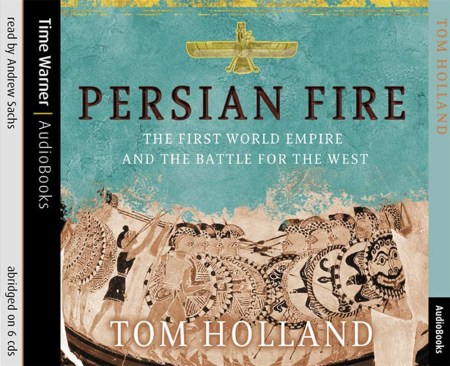In 480 BC, Xerxes, the King of Persia, led an invasion of mainland Greece. Its success should have been a formality. For seventy years, victory – rapid, spectacular victory – had seemed the birthright of the Persian Empire. In the space of a single generation, they had swept across the Near East, shattering ancient kingdoms, storming famous cities, putting together an empire which stretched from India to the shores of the Aegean. As a result of those conquests, Xerxes ruled as the most powerful man on the planet. Yet somehow, astonishingly, against the largest expeditionary force ever assembled, the Greeks of the mainland managed to hold out. The Persians were turned back. Greece remained free. Had the Greeks been defeated at Salamis, not only would the West have lost its first struggle for independence and survival, but it is unlikely that there would ever have been such and entity as the West at all.
Tom Holland’s brilliant new book describes the very first ‘clash of Empires’ between East and West. Once again he has found extraordinary parallels between the ancient world and our own. There is no competing popular book describing these events.
Tom Holland’s brilliant new book describes the very first ‘clash of Empires’ between East and West. Once again he has found extraordinary parallels between the ancient world and our own. There is no competing popular book describing these events.
Newsletter Signup
By clicking ‘Sign Up,’ I acknowledge that I have read and agree to Hachette Book Group’s Privacy Policy and Terms of Use
Reviews
Confident, fluent and accessible, and with salutary lessons for our own times, this is history at its best
Excellent... Holland is a cool-headed historian who writes no less authoritatively and engagingly on classical Greece than he did on ancient Rome
A welcome popularization of ancient history, with a nicely vengeful cliffhanger of an ending that begs for a sequel
This book is an unequivocal argument for the relevance of ancient history... Holland never strains for modern references; they are implicit in the stories he tells with such scholarship and flair
It is a testament to Holland's superlative powers as a narrative historian that he brings this tumultuous, epoch-making period dazzlingly to life
In the sweep and vividness of his prose Tom Holland does the subject proud, and he is also good at trying to look at the conflict as much through Persian eyes as Greek, and at getting inside the psyche of Darius and Xerxes
Magisterial... told with great authority and a novelistic colour and verve
Ambitious... a sweeping popular account that seems destined to become a classic
Gripping and authoritative ... An awe-inspiring story of the struggle for freedom
Holland doesn't impose a modern sensibility on the ancient civilizations he describes, and he delves into the background histories of both sides with equally fascinating detail... the story of the Persian empire should be fresh and surprising to many readers, while Holland's graceful, modern voice will captivate those intimidated by Herodotus
A page-turning account of a conflict that genuinely was one of the pivots on which world history has turned... His descriptions of the great confrontations of the war provide miniature masterclasses in the art of exciting historical writing... This is a terrific book, combining impeccable scholarship with the narrative drive of a fine novel
Holland has a rare eye for the detail, drama and the telling anecdote... A vibrant, bloodthirsty popular history, told with a rich sense of irony and irresistible narrative timing
Thrilling... a fascinating insight into Europe's development

